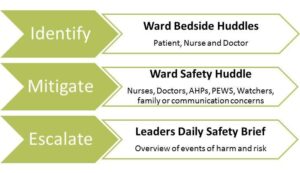COVID19: Systems and Situation Awareness
Resources from the international QI community with a focus on patient safety and situation awareness during the COVID19 pandemic.
The International Society for Quality in Health Care has published patient safety recommendations for the COVID-19 pandemic here.
It describes supporting the health system according to the Systems Engineering Initiative for Patient Safety Human Factors framework that includes:
- Assessment and visualisation of the clinical work system dynamics:
- The organisational culture.
- Team communication.
- The internal and external environment.
- The skill set required to complete necessary tasks.
- The equipment for patient care and to protect staff.
- The people needed to provide care.
- The patients who will receive care.
- Identification of the barriers and facilitators for healthcare workers in their work systems and developing reliable pathways of care.
- Measurement of the outcomes of care with embedded feedback loops to enable adaptation of the system to drive continuous improvement.
Incident management structures are required to respond to a rapidly changing and evolving system. Human factors and ergonomics can provide methods and approaches for adaptation, redesign and enhancement of health care systems – full resources are available from the Chartered Institute of Ergonomics and Human Factors and the Clinical Human Factors Group.
Situation awareness is also key to ensure the system can adapt to both anticipated and unanticipated outcomes. Planning decisions should be situation-based and information disseminated to staff in real time.
Safety Huddles
The huddle is a core intervention for situation awareness. It aims to change the way we approach the care of children and young people from reaction to anticipation. It is proactive and allows the sharing of information:
- Unit-based huddles on a regular basis enables proactive identification of risk ahead of deterioration.
- Three to four inpatient ward huddles each day provides collective understanding and shared insight.
- Unit or divisional huddles as well as a hospital-wide huddle creates a continuous learning system to evaluate situation awareness at all levels.

The Situation Awareness for Everyone huddle toolkit is available in full here.
Watch tutorials from all 4 modules of the toolkit here.
Team videos showing examples of huddles in a paediatrics setting are available here.
